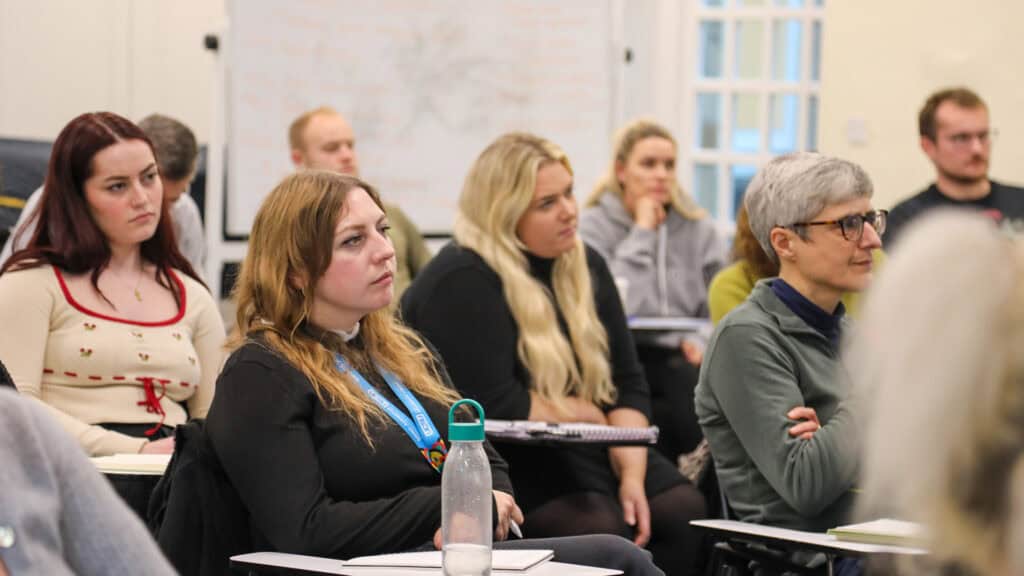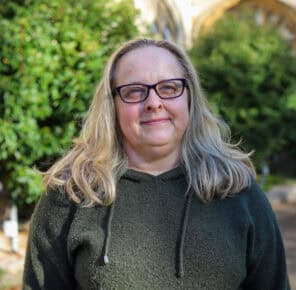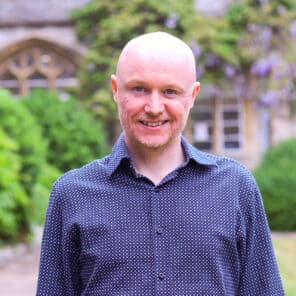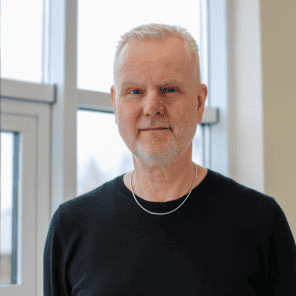1st
in Counselling for teaching on my course
National Student Survey 2024
4th
in the UK for overall average positivity for Counselling
National Student Survey 2024
7th
in the UK for student satisfaction
in Psychology
Complete University Guide League Tables 2025
Join us at one of our Open Days!
Saturday 11 October
Sunday 26 October
Saturday 22 November
Saturday 11 October
Sunday 26 October
Saturday 22 November
Our next Open Day is in:
Overview
Gain a scientific understanding of a broad range of mental health concerns
Our BSc (Hons) Counselling Psychology degree provides you with the necessary psychology and counselling theories, knowledge and skills to start your journey to become a counselling psychologist.
Learn to support those with mental health concerns
Using psychological theory and research combined with counselling skills, you will learn to design and deliver interventions to help clients with a range of difficult life issues and/or mental health conditions. You will explore a range of approaches to improving a sense of wellbeing, alleviating feelings of distress and resolving crisis for people with physical, emotional and mental health issues.
Versatile skills for client-centred professions
Open doors to exciting careers with skills that are highly sought-after across clinical and health psychology, counselling psychology, coaching psychology, and a variety of mental health professions. Whether you aim to support people’s well-being, navigate life challenges, or make a difference in diverse settings, this degree is a valuable foundation.
Learn from inspiring experts
Our lecturers are not only passionate teachers but also active researchers and practitioners. They bring cutting-edge insights and real-world experiences into every class, making your learning relevant, engaging, and directly connected to today’s mental health field.
Master professional relationship-building
Develop essential skills for building effective, ethical, and well-boundaried relationships—vital for success in any mental health or client-centred profession. You’ll graduate with a strong understanding of how to support others responsibly and effectively.
Reflect and grow
Our programme encourages ongoing reflection, allowing you to connect theory to practice and cultivate both personal and professional growth as you progress through your studies.
Career-ready focus
Get a head start on your future! Our career-focused modules include practical workshops on interview skills, CV development, guest speaker events, and portfolio building. We’ll help you build a pathway to careers not just in counselling psychology but also in areas like health services, forensics, and education.
National Student Survey 2023
Learning resources
Student voice
Mental wellbeing and communication
Accreditation
Our BSc (Hons) Counselling Psychology course is accredited by the British Psychological Society (BPS), which means you’ll graduate with an industry-recognised qualification and take a first step towards becoming a psychologist*.

On this course you will:
- Understand and support people with a variety of life and mental health issues.
- Examine the psychological theory behind counselling practice.
- Learn from psychology and counselling experts who get to know you and your needs.
- Study on a BPS-accredited course and take the first step to becoming a psychologist.
*This degree provides essential counselling skills but does not qualify graduates for private practice as a counsellor.
The Course
Explore a wide variety of psychology and counselling approaches
Year One
Your first year introduces you to fundamental counselling frameworks and psychological concepts and theories, as you examine a range of everyday experiences using psychological models of attitudes.
Year Two
In your second year, you will examine biological, cognitive and developmental psychology as you broaden your understanding of aspects including lifespan development and the therapeutic process
In addition, you will further your knowledge and skills in statistical data management, as well as the design and implementation of research experiments.
Year Three
In your final year, you will work to apply your acquired subject knowledge and research skills ahead of a final-year project on a topic of your choice, as you learn more about person-centred therapy, mindfulness, compassion-focused therapies and brief therapy.
Indicative modules
You will study a selection of core and optional modules in each year. Each module is worth a number of credits and is delivered differently depending on its content and focus of study.
Modules
Select a year
Social Minds: Exploring Human Interaction
The module will explore the experience of relationships through the processes related to forming an impression of people, feeling attracted or not to them, wanting to be their friend, getting to know them and forming a relationship with them, through a variety of behaviours, such as approaching them, talking to them, and meeting them socially.
Psychological theories and empirical findings from investigations into impression formation will be introduced, and methodology will be explored.
Thinking Like a Social Scientist: Study and Research Skills
This module will introduce you to research skills that are essential for your academic success and growth. It introduces you to the basics of data analysis and covers key concepts in time management and teamwork. You’ll develop your critical thinking skills to enhance your ability to present convincing arguments in written work, and your academic reading skills will also develop to enable you to access complex scientific reports.
Additionally, the module will teach you how to produce high-quality assessments, including creating references and citations using APA style, presenting information effectively, and writing well-structured essays.
Core Skills and Ethics in Counselling Psychology
This module introduces you to fundamental counselling psychology skills and ethical considerations, integrating theoretical knowledge, skills development, and applied practice.
You will explore the philosophical and theoretical roots of counselling psychology with a Humanistic emphasis, while also engaging with psychodynamic and cognitive-behavioural perspectives to understand their role in different therapeutic contexts.
Throughout the module, you will engage with ethical frameworks (e.g., BPS, HCPC), learning about professional responsibilities such as confidentiality, boundaries, and ethical decision-making.
You will also develop core counselling skills such as active listening, empathy, and open questioning, with an emphasis on your application in professional contexts. Learning activities will include structured skills practice, observation of counselling demonstrations, guided self-reflection, and peer feedback. Through these experiences, you will build confidence in therapeutic interactions while critically reflecting on your own development and emerging professional identity.
Facilitating Wellbeing: Positive Perspectives
Based on the discipline of Positive Psychology, the module will explore the experience of living well, relating the need to understand well-being, emotions, motivation, aspirations and goals to self-development, personality traits, needs for achievement, self-efficacy, and self-esteem, environmental influences and the enhancement of well-being.
Psychological theories and empirical findings from investigations into needs, motivation and traits will be introduced, as will the use of selected nonparametric statistics.
This module aims to give you an understanding of a broad area of everyday functioning and experience in terms of the behaviours, feelings, attitudes, and mental processes involved in that experience.
The module also aims to use functional analysis so that a broad experience can be broken down into a series of questions concerning the sub-functions and behaviours involved, allowing the psychological constructs and theories that are associated with those behaviours to be elucidated and explored. Exploration will involve appropriate methods to investigate what psychological constructs and theories relate to relevant behaviours and function.
The module will explore the experience of positive psychology relating the need to understand one’s own motivation, aspirations, and goals to self-development, personality, need for achievement, self-efficacy and self-esteem.
Psychological theories and empirical findings from investigations into emotions, traits and environments will be introduced and non-parametric methodology will be explored.
Mind and Machine
The module aims to develop an understanding of a broad area of everyday functioning and experience in terms of the behaviours, feelings, attitudes and mental processes involved in that experience.
You will use functional analysis so that a broad experience can be broken down into a series of questions concerning the sub-functions, psychological states and behaviours involved, allowing the psychological constructs and theories that are associated with those states and behaviours to be elucidated and explored.
Exploration will involve appropriate methods to investigate what psychological constructs and theories relate to relevant behaviours and function.
The Science of Behaviour: Theory to Evidence
This module introduces the conceptual and historical issues in psychology, as well as the work of prominent figures who have influenced the development of modern psychology. You will begin to explore key thinkers in psychology, focusing on how key thinkers design and conduct research in their field.
Human Cognition and Individual Differences
This module explores how we think (Cognitive Psychology) and how we differ from one another (Individual Differences).
The aim of this module is to introduce you to basic theory, research findings and methods of investigation in perception, attention, learning, memory, face and object recognition and problem-solving.
Developmental Psychology
Developmental Psychology involves the study of development and maturation in cognitive, personality and social processes.
The aim of this module is to introduce you to fundamental theory, research findings and methods of investigation in infancy, childhood, adolescence, adulthood and overall lifespan development.
The module will aim to provide a critical understanding of ways in which behaviour is influenced by developmental factors, the nature of developmental processes, and ways in which empirical research can help us to understand how developmental processes influence what we do.
Research Methods: Experimental Design and Analysis
The module aims to develop an understanding of experimental designs and associated methods of analysis related to psychology, and introduces you to research ethics. The introduced methods are variants of Analysis of Variance (ANOVA), a method that allows comparison of groups and/or conditions.
Biological Psychology
Biological Psychology involves the study of the biological and psychological bases of mind and behaviour.
This module will introduce you to basic theory, research findings and methods of investigation in behavioural genetics, neuroscience and neuropsychology.
The module will aim to provide a critical understanding of the ways in which behaviour is influenced by biological factors, how we study these biological processes and why these processes are important in applied psychological settings.
Applied Counselling Psychology Skills and Client Issues
This module builds on core counselling skills, introducing deeper relational engagement through PCEPS skills development and applied ethical considerations. You will explore various client presenting issues, working with differences and diversity, and the relationship between counselling psychology and other approaches.
You will examine ethical dilemmas, professional boundaries, and power dynamics while enhancing self-awareness and relational depth. Through structured skills practice and experiential learning, you will develop the ability to apply theory to diverse client presentations, navigate ethical complexities in professional settings, and continue developing your counselling skills.
Research Methods: Survey & Qualitative Designs and Analysis
The module aims to develop an understanding of survey and qualitative designs and associated methods of analysis related to psychology.
The module will develop knowledge of survey and qualitative approaches to investigating and analysing psychological data. The relationship between correlational analysis and predictive reasoning will be outlined. Areas covered include multivariate analysis (multiple regression) and thematic analysis.
Independent Project
The Independent Project provides an opportunity to apply appropriate knowledge, concepts, techniques and research methods of psychology to an in-depth study of a particular question or problem related to psychology.
This module aims to foster a greater understanding of the processes involved in undertaking a research project and marks the culmination of your learning experience.
The study will enable you to produce a written research report, and a poster presenting a summary of your research and findings.
Project Management and Presentation Skills
This module enables you to deliver a wide range of skills, from project management to presentation of results in an accessible form.
In this module, you will have the opportunity to develop your project management skills, to further develop your scientific reasoning and reporting skills, and to learn skills necessary for producing a poster presenting research work.
Coaching and Health Psychology
The aim of this module is to introduce the professions of Health and Coaching Psychology as career options for psychologists. During this module, you will gain insight into the theory, practice, and research undertaken by health and coaching psychologists.
The Module will be divided into three parts covering:
- Theoretical underpinnings of health and coaching psychology (e.g. Behaviour change models, Goal Setting); understanding the importance of life context, social inequalities and health literacy;
- Applications of Health and Coaching Psychology whereby the role of each discipline will be applied to health-related case studies (e.g. living well with a range of long-term conditions) in order to highlight the benefit of working as part of multi-disciplinary teams;
- The future of Health and Coaching Psychology as a career option: how bigger picture issues such as technology developments and the Anthropocene Age might impact approaches to coaching and health-related interventions will be explored.
Professional Journeys in Counselling Psychology
This module provides you with an opportunity to review and clarify many of the practice issues raised in previous modules, giving you a chance to continue to develop your ethical and professional awareness, as well as your employability.
Further aspects of employability, such as developing the CV, preparing for interviews and answering job applications, will be discussed.
You will have an opportunity to review and clarify your values and beliefs in relation to professionalism, assessment, outcome measures and contemporary developments in the world of counselling psychology and related professions.
Innovations in Psychological Therapies: Mindfulness and Brief Interventions
The aim of this module is to provide a critical understanding of mindfulness and compassion-focused psychotherapies, exploring their theoretical foundations and practical applications.
You will engage with specialist approaches used within therapeutic settings, developing insight into their effectiveness and suitability for diverse client needs.
Teaching and Assessment
Feel the support of our expert and experienced staff
National Student Survey 2023
Academic support
Learning resources
Assessment and feedback
Smaller class sizes for better learning
You will build your subject knowledge and practical experience through lectures, workshops and tutorials in small classes, which means our expert teaching staff really get to know you and the support you need.
Become part of open discussions
Sessions will encourage theoretical and critical inquiry and debate using discussions that require a high level of self-awareness.
You should be able to discuss your experiences of mental health — whether this is your own mental health or the experiences of others.
Learn more about our teaching staff
Dr. Valentina Canessa-Pollard
Valentina is Head of BSc Counselling Psychology Programme, a Fellow of the Higher Education Academy, and a Chartered Psychologist with British Psychological Society.
Valentina’s research interest centre around human non-verbal communication and sexual violence prevention and recovery.
Kate Hicks
Kate gained her Degree in Counselling Psychology (BSc) at the University of Chichester. She is now a Counselling Psychologist in training working towards her professional doctorate, specialising in Existential psychotherapy, which focuses on exploring meaning and purpose in life. She is a Lecturer in Psychology, teaching on a number of modules across the degree programmes and levels.
Prior to joining us, Kate has gained over 30 years of professional experience from her senior corporate leadership roles across HR, project management, retail operations, and commercial functions.
Moitree Banerjee
Moitree is the Head of Psychology and Criminology Programme in the Institute of Psychology, Business and Human Sciences. She is a Reader in Clinical Psychology.
Iva Coombes
Iva is a psychotherapist and counsellor with extensive experience working with various client groups as well as teaching counselling.
James Stiller
James has taught, developed, and led on a range of undergraduate and postgraduate psychology modules and courses.
James has a diverse range of research interests, including:
- Social network analysis and the evolution of social groups
- The connection between engaging with nature and wellbeing
- Visual perception
- Reading and maths comprehension in children
- Bullying behaviour in schools
Ian Tyndall
Dr Ian Tyndall is a cognitive-behavioural psychologist in the Department of Psychology.
Ian’s research is particularly focused on experimental investigations of cognitive and behavioural processes underpinning clinical psychology conditions.
Ian is the Study Abroad officer and the Employability Officer for the Department.
Daniel Connolly
Daniel’s background is in developmental psychology and education. His D.Phil. thesis is titled ‘Theory of Mind and Executive Function in 3- to 5-year-old Children’ and examined the links between the development of control associated with the brain’s frontal lobes and their ability to deceive others and predict their behaviour based on an understanding of their mental states.
Daniel’s post-doctoral work focused on children’s use of interactive technology with a particular interest in how digital technology can exploit social learning processes to enhance learning.
Contact Time
Each module has three hours of contact time per week. You will study four modules per semester so you will have 12 contact hours per week. This time includes lectures, seminars and workshops.
Assessments
You will be assessed through a range of assignments including:
- Scientific reports
- Essays
- Group and individual presentations
- Poster design
- Multiple choice papers
- Short answer papers
- Research participation.
Experience
Discover our range of specialist research equipment and facilities
Brain Imaging Unit and Neuroimaging: NIRScout
Our neuroimaging system with a 3D scalable ultra-high-density near-infrared spectroscopy platform measures changes in the cerebral cortex using NIRScout and NIRx Medical Technologies.
Advanced Physiological Data Acquisition system
Our specialist advanced data acquisition system allow you to measure physiological activity from the brain, heart and motor neuron pathways with Biopac software.
Eye tracking software
Our specialist eye tracking software allows you to track shifts in visual attention and can be used for attentional retraining purposes.
Specialist Advanced Research Software
Software for measuring and manipulating a broad range of psychological constructs; Inquisit, Qualtrics, Noldus Observer XT, E-prime, Superlab and Nvivo.
Learning Resource Centre
The Learning Resource Centre (LRC) contains the library, a café, IT/teaching rooms and the Support and Information Zone (SIZ).
Library
Our campus library holds more than 200,000 books and over 500,000 eBooks.

Kieran
Optional Foundation Year
Develop your academic confidence and skills with an initial foundation year
We also offer a BSc (Hons) Counselling Psychology with Integrated Foundation Year course.
This four-year course is for you if you have not met the course entry requirements yet, or if you feel like you may need a little more preparation to make the most of your university studies.
Study Abroad
Explore the opportunity to study part of your course abroad
You may complete an international or European exchange as part of your studies. You may choose to undertake an exchange for one semester or a whole year at one of our partnership institutions.
Psychology supports students in both the BSc programme pathways who wish to broaden their academic and cultural experience by choosing to study abroad for one semester as part of their degree studies. This is an exciting chance for students who wish to widen their horizons and immerse themselves in a different culture and encounter how the discipline of Psychology is viewed and taught at universities in Europe or North America.
We are currently expanding the range of international exchange opportunities that we offer our students.
Careers
Where you could go after your studies
Our BSc (Hons) Counselling Psychology course provides you with the knowledge and skills you need to pursue a career as a professional counselling psychologist, working as part of a team in larger settings such as health services or the NHS.
Counselling psychologists may work with children, young people, adults, families, groups or at organisation level.
You may work with people experiencing bereavement and personal losses, in relationship contexts or those who have escaped a situation involving domestic violence or sexual abuse. You will support people with all sorts of traumas and mental health problems.
Potential career settings include;
- Health services such as acute admissions, psychiatric intensive care or rehabilitation.
- Improving Access to Psychology Therapist services (IAPT).
- Community mental health teams.
- Child and Adolescent Mental Health Services (CAMHS).
- Forensic settings.
- Education or research.
- Corporate institutions.
Becoming a Chartered Counselling Psychologist
After your degree, you may choose to work in one of the settings mentioned above, or you could become a Chartered Counselling Psychologist through a BSP-accredited doctorate or stage 2 training in counselling psychology.
Our BSc (Hons) Counselling Psychology degree has the status of the Graduate Basis for Registration (GBR) with the BPS. You will need a Graduate Basis to progress to specialist areas of psychology and become a Chartered Psychologist.
Course Costs
Course Fees 2025/26
UK fee
International fee
EU/EEA Fee Reduction Scholarship
EU/EEA students automatically pay the equivalent of UK fees via the EU/EEA Fee Reduction Scholarship
For further details about fees, please see our Tuition Fee page.
For further details about international scholarships, please see our Scholarships page.
To find out about any additional costs on this course, please see our Additional Costs page.
Entry Requirements
Applying through Clearing
We know that you are so much more than your grades, which is why we take your aspirations, passion and personality into account. Through Clearing, we’re taking a flexible approach. Even if your grades are a little different from those advertised, please contact us – we’ll consider every application individually.
Typical offers (individual offers may vary):
UCAS
A Levels
BTEC/Cambridge Technical
Access to HE Diploma
IB
IELTS
Contextual offers
We believe everyone deserves an equal opportunity to pursue higher education, regardless of their background.
When we receive your application we consider your personal circumstances and the factors surrounding your achievements to see if you are eligible for a contextual offer. This is an offer with a reduced entry tariff – typically the equivalent of 16 fewer UCAS points (two A-level grades).
Find out more about our contextual offers.
Are you interested in this course and would like to learn more? Please email Professor Esther Burkitt on e.burkitt@chi.ac.uk for admissions queries.
Integrated Foundation Year
We also offer BSc (Hons) Counselling Psychology with an integrated foundation year. This means you have the option to complete an extra year of study before starting the BSc to build your subject knowledge and develop your academic writing, reading and research skills. This option is for you if you are interested in psychology but do not meet the course entry requirements yet, or if you want more time to prepare for higher education.
Non-standard Application Entry Routes
The University has an alternative entry route for applicants who have relevant skills and experience but who do not hold the formal minimum entry qualifications required. Applicants who demonstrate the necessary skills and experience to enter a course of higher education will be asked to complete an entry task involving the completion of specially set assignments.












